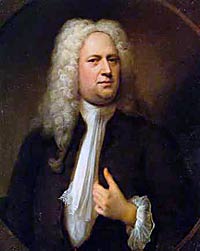Readings:
Psalm 150
2 Chronicles 7:1-6
Colossians 2:2-6
Luke 2:8-14Preface of a Saint (3)
[Common of an Artist, Writer, or Composer]
[For Artists and Writers]
PRAYER (traditional language)
Almighty God, beautiful in majesty and majestic in holiness: Thou gavest to thy musicians Johann Sebastian Bach, George Frederick Handel, and Henry Purcell grace to show forth thy glory in their music. May we also be moved to sound out thy praises as a foretaste of thy eternal glory; through Jesus Christ our Savior, who liveth and reigneth with thee and the Holy Spirit, one God, for ever and ever. Amen.
PRAYER (contemporary language)
Almighty God, beautiful in majesty and majestic in holiness: You gave to your musicians Johann Sebastian Bach, George Frederick Handel, and Henry Purcell grace to show forth your glory in their music. May we be also moved to sound out your praises as a foretaste of your eternal glory; through Jesus Christ our Savior, who lives and reigns with you and the Holy Spirit, one God, for ever and ever. Amen.
This commemoration appears in A Great Cloud of Witnesses. The collects and readings above are from when this commemoration was combined with that of JS Bach.
Return to Lectionary Home Page
Webmaster: Charles Wohlers
Last updated: 30 May 2022
GEORGE FREDERICK HANDEL and HENRY PURCELL
COMPOSERS, 1759, 1695
 George Frederick Handel (Georg Friedrich Händel) was born at Halle in Germany in 1685. He originally studied for the law and then began to write operas. He moved to Italy in 1706 and to England in 1710, where in 1726 he became a British subject. From operas, Handel turned to the writing of oratorios, works with a religious theme to be sung by soloists and a chorus. His greatest work, The Messiah, was first performed in Dublin in 1741. The words are Scriptural passages from both Testaments dealing with the birth, death, and resurrection of Jesus. G B Shaw referred to it as "the hymn that can make atheists cry." (My advisor, Herbert Feigl, an atheist of Jewish ancestry, loved it and went to church whenever it was to be sung.) In most large towns in the English-speaking world, it is performed every Christmas and Easter. Handel died 14 April 1759.
George Frederick Handel (Georg Friedrich Händel) was born at Halle in Germany in 1685. He originally studied for the law and then began to write operas. He moved to Italy in 1706 and to England in 1710, where in 1726 he became a British subject. From operas, Handel turned to the writing of oratorios, works with a religious theme to be sung by soloists and a chorus. His greatest work, The Messiah, was first performed in Dublin in 1741. The words are Scriptural passages from both Testaments dealing with the birth, death, and resurrection of Jesus. G B Shaw referred to it as "the hymn that can make atheists cry." (My advisor, Herbert Feigl, an atheist of Jewish ancestry, loved it and went to church whenever it was to be sung.) In most large towns in the English-speaking world, it is performed every Christmas and Easter. Handel died 14 April 1759.
— by James Kiefer
 Henry Purcell (10 September 1659 (?)– 21 November 1695), was an English organist and Baroque composer of secular and sacred music. Although Purcell incorporated Italian and French stylistic elements into his compositions, his legacy was a uniquely English form of Baroque music.
Henry Purcell (10 September 1659 (?)– 21 November 1695), was an English organist and Baroque composer of secular and sacred music. Although Purcell incorporated Italian and French stylistic elements into his compositions, his legacy was a uniquely English form of Baroque music.
Purcell was born in Westminster (now part of London) into a family of musicians. His family was connected with the Royal Court, and Henry was a chorister in the Chapel Royal until his voice broke in 1673.
In 1679, his teacher, Dr. John Blow, who had been appointed organist of Westminster Abbey in 1669, resigned his office in favour of his pupil. Purcell now devoted himself almost entirely to the composition of sacred music, and for six years severed his connection with the theatre. However, the composition of his chamber opera Dido and Aeneas, which forms a very important landmark in the history of English dramatic music, has been attributed to this period.
Soon after Purcell's marriage, in 1682, on the death of Edward Lowe, he was appointed organist of the Chapel Royal, an office which he was able to hold simultaneously with his position at Westminster Abbey. For some years after this, he was busy in the production of sacred music, odes addressed to the king and royal family, and other similar works. In 1685, he wrote two of his finest anthems, "I was glad" and "My heart is inditing", for the coronation of King James II. One of Purcell's most elaborate, most important and most magnificent works was a birthday ode for Queen Mary. It is titled Come ye Sons of Art, and was written by Nahum Tate and set by Purcell. Purcell's Te Deum and Jubilate Deo were written for Saint Cecilia's Day, 1693, the first English Te Deum ever composed with orchestral accompaniment.
Purcell died in 1695 at his home in Dean's Yard, Westminster, at the height of his career. Purcell is buried adjacent to the organ in Westminster Abbey. The music that he had earlier composed for Queen Mary's funeral was performed during his as well. Purcell was universally mourned as 'a very great master of music.'
— more at Wikipedia